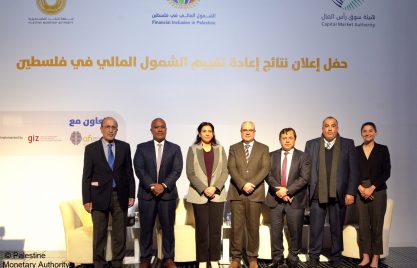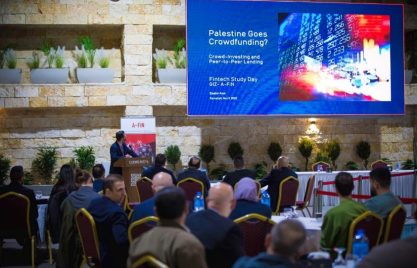The Palestinian opportunity to attract fintech startups is unique. This is thanks to a young and tech-savvy population, high demand for alternative financial products, and a vibrant Palestinian diaspora eager to actively use the digital realm to engage with the Palestinian economy.
The fintech revolution is sweeping up the world, and the Middle East is playing its part in this global trend. In 2021, MENA Fintech start-ups secured $4 billion of funding from VC, institutional and angel investors. The demand for fintech services is clear as most countries in the MENA region have high unbanked populations, exceeding the 50% mark, and low financial inclusion. Palestine has a unique opportunity to attract fintech start-ups. This is thanks to a young and tech-savy population, high demand for alternative financial products, and a vibrant Palestinian diaspora who both lead a number of fintech start-ups in the region and are eager to actively use the digital realm to engage with the Palestinian economy.
If the vision is to make Palestine an important stop for fintech companies in the region, then there is enough appetite from regional startups to achieve this objective. Nevertheless, a priori to attracting regional fintech to Palestine is to understand the requirement of startups and financial service providers for an expansion and create a favourable environment for them to come to.
Palestinian Regulators are ready
In March 2021, the Palestine Capital Market Authority (PCMA) supervising the activities of the non-banking financial sector, launched its regulatory innovation office “Ebtaker” (the Arabic word for “innovate”), which aims to facilitate effective communication between the PCMA and innovators in the non-banking financial sector. Ebtaker provides in addition regulatory guidance and clarification as well as issuing no-objection letters. The Palestine Monetary Authority (PMA) launched its regulatory sandbox in March 2022 offering a live testing ground for fintechs which are developing new banking related business models.
Initiatives and Activities Can Make the Difference:
This year, Palestine has witnessed a few initiatives that are the first steps to facilitating fintechs’ in Palestine network building, access to human capital, and market research. Perception is managed through economic research, data publishing, case studies, and a strong regulatory authority social media presence. Such events aim to raise awareness, highlight opportunities, and amplify success stories in the Palestinian market. For example, the Fintech Palestine summit took place this year for the first time and attracted around 200 attendees. Moreover, GIZ together with SANAD TAF launched a “Fintech for a Future” accelerator program. The program will support promising entrepreneurs with the ideation and scaling up of their fintech startups targeting also the cross-border fintech ecosystem’s connectivity between Palestine and Jordan. PCMA’s upcoming insurance innovation challenge and hackathon in cooperation with GIZ and Fintech Galaxy will attract international applications in the field of insurtech.
More work to come: Nationwide Communication Strategy to attract fintechs
Most startups need assurance of a strategic vision that includes the importance of fintech to the country. This is crucial in a sector that is highly regulated, where the tension between regulating or not is decided by politics rather than necessity. Strict and unnecessary regulation can suppress innovation. There are many ways to show national backing and a clearly stated national vision for fintech. One way is by pioneering early regulation for frameworks for novel sectors such as cryptocurrency. Another way of communicating political will is by having leadership openly discussing opportunities with the media. As seen regularly in the UAE for instance, HRH Sheikh Mohammad Bin Rashed often communicates news regarding new regulations. Recently HRH Bin Rashed has tweeted an announcement of federal government regulation on crowdfunding and added his take on the importance of crowdfunding as an important financing mechanism in the UAE.
Streamlining the expansion of Fintech into Palestine
The launch phase is very important where startups will step up its communication with local partners in order to launch. Local partners could be service providers, distribution or sales partners. It is important to have an advisory team to help the startups navigate the difficulties of operating in Palestine for the first time. The advisory could be on logistics, price, finding more and new partners, or even advising on matters of culture.
Most startup cofounders would say market expansion in major markets such as UAE, Egypt and Bahrain was very easy and streamlined. Regulators in those markets are conscious that most startups want to launch within 6 months. This is manifested within the first 6-8 weeks start ups, when should talk, research and network within the ecosystem to be able to focus on sandbox testing within the following 6-8 weeks and preparing their launch in the remaining 6-8 weeks. Fintechs need to be exposed quickly and efficiently to all aspects of the regulatory framework, potential partners and operational scalability. Palestine is looking into nationwide efforts including fintech champions in the private sector, academia, innovation and diaspora individuals. These efforts will collectively cumulate into a viable ecosystem in the near future.
If you are a fintech startup, that is interested to explore the potential of the Palestinian market, feel free to reach out to GIZ’s A-FIN project: a-fin.pal@giz.de
By Odai Masharqa,
With input by Deborah Rammrath and Shurouq Qawariq
The information of this blogpost was gathered through research and exchanges through January – June 2022 and is subject to change throughout time.



